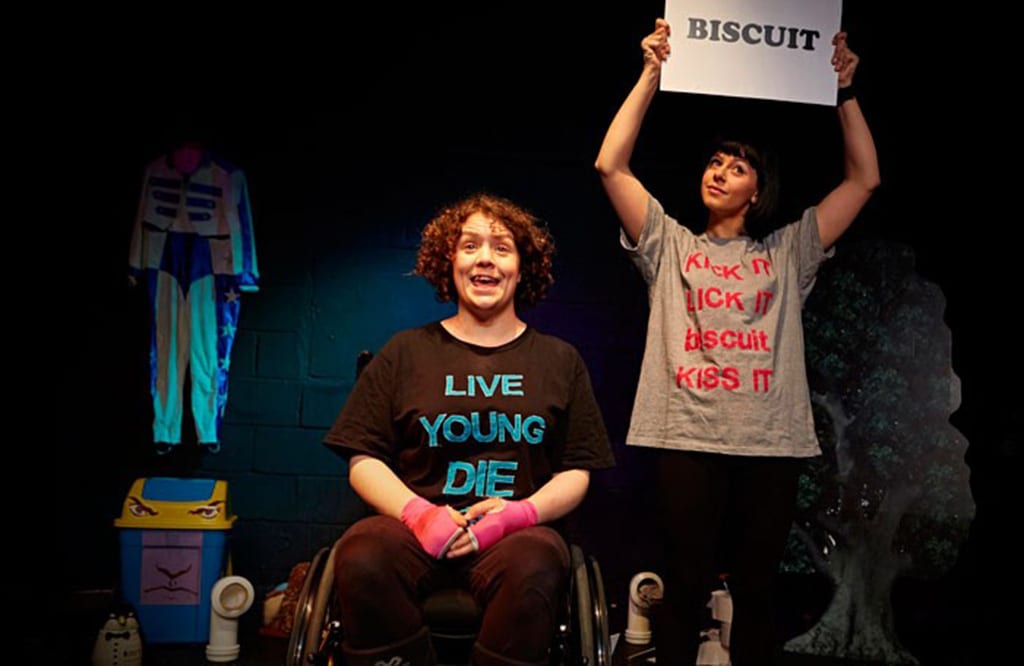Jess Thom has Tourette’s Syndrome. This neurological condition renders her incapable of being silent or still. Her first live show, Backstage in Biscuit Land, creates a new vision of inclusive theatre, driven by her own experience of exclusion. Each performance is unique as Jess is liable to, and frequently does, veer off-script at any moment.
Backstage in Biscuit Land is an earnest mixture of pop culture and whimsy; clever, funny and engaging. A dinosaur balloon, a cardboard tree and a photograph of Mother Theresa vie for your attention with uncontrollable, irrepressible giggling on this busy set. A teddy bear at the front of the stage mutters incoherently and the protagonist, Jess Thom, chats casually to her co-star, Chopin (Jess Mabel Jones), from the wings. Chopin’s laughter is contagious. The uncertainty of the audience at the outset is immediately offset by Chopin’s (Jess Mabel Jones) confidence and Jess’s mischievous wit.
This play is brought to life by the spontaneity of Jess and Chopin’s dialogue. Their interaction is completely unpredictable. The nervous energy of the audience, as conventions of modern theatre and audience engagement are stripped one by one, is soothed by the intimacy of Jess’s storytelling; confessions of her disillusionment with conventional theatre and the vulnerability of losing control over her own body. The play owes its coherence to the relationship between Jess and Chopin, their easy repartee, flexibility and good humour make their performance dynamic and engaging.
The performance proceeds like a conversation between friends, constantly changing direction. From the first the closed world of the stage is shattered. This production is motivated by the desire to include, starting with a self-description by the protagonists and an explanation of the strange props on stage, making the performance available to a blind audience. Chopin informs you, immediately, that this will be a relaxed performance. There are no prescriptions for behaviour. The audience may move and participate and, most importantly, laugh, as they wish. This show takes you backstage to reimagine a show in which there are no preconceptions and loose guidelines. The script is being rewritten, rehearsed and improvised before your eyes.
In just an hour Jess and Chopin draw you, imperceptibly, from quirky, surreal banter to an encounter with complex questions about social interaction, segregation, discrimination and human dignity. Jess’s anecdotes and confessions bare her experience of difference to the audience. Her confidence draws you out of yourself and into her world.
This play successfully raises awareness of Tourette’s Syndrome and those who live with it, in any guise. And ultimately, it suggests, we all do. Jess introduces the people around her who help her to achieve ‘normal’, and whose support helps her to accept herself and her condition and redefines the boundaries of normative behaviour. However, the impact of this performance runs far deeper than a mere exposition of living with Tourette’s, it introduces you to the incredible creativity of Jess’s word association, her rapid-fire response to language and gesture that guide the ‘script’, or lack thereof. At her best Jess summons an astonishing breadth of vision and rhythm that leaves the audience reeling, running to catch up with her thoughts and emotions. Jess and Chopin’s innovative production is a brave challenge to the boundaries of conventional theatre and the notion of sense.
Backstage in Biscuit Land draws you from everyday trials and triumphs to crucial questions which inform our lives; how do our actions affect those around us? How do we include others, those who do not fit into a ready mould of ‘acceptable’ behaviour? How do we recognize and embrace our own difference as a source of creativity?
Light-hearted and achingly funny this play leaves you feeling uplifted, inspired and encouraged to bare your own strange quirks. Jess’s fearless exposure of her vulnerability makes her, and you with her, stronger. From a show about one woman’s struggle to accept her own limitations this play becomes a prism through which anyone may understand their own place in society. This is an intimate portrayal of Jess’s journey from being misunderstood and alone, to representative of every individual’s desire to be accepted.

